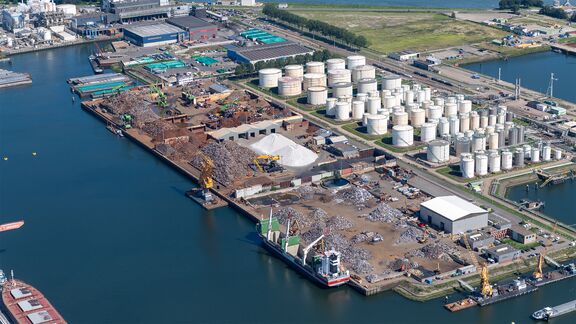Port of Rotterdam Authority looking into opportunities and consequences of raw materials transition
Reading time: 4 minutes
The Port of Rotterdam Authority is currently investigating the consequences and opportunities of the raw materials transition for the Rotterdam port and industrial complex.
The Netherlands and Europe have the ambition of not only being CO2 neutral by 2050, but also to have a fully circular economy. Many primary raw materials are delivered to Rotterdam to be processed by the industry or transported elsewhere. On 8 February, the Port of Rotterdam Authority and the Institute for Sustainable Process Technology are jointly organising a conference on the raw materials transition.

Circular and renewable
The Social and Economic Council of the Netherlands (SER) defines a circular economy as one in which ‘we deal radically more efficiently with raw materials, other materials and products in order to limit the use of natural resources and environmental pressure caused during production, use and waste phase’. The raw materials transition is important to sustainability, and it also reduces dependence on unstable or unreliable countries. In a circular economy, products are recycled at the end of their lifespan. In addition, there are renewable raw materials such as biomass and green hydrogen. The result is that there are (almost) no new raw materials that will have to be extracted from the earth.
20% sustainable fuels by 2030
Nico van Dooren, Director New Business of the Port of Rotterdam Authority: 'The raw materials transition is not a new topic for the port of Rotterdam. The carbon transition, as it’s called, is already up and running. 'Hydrocarbons are the main component of everything that is currently made from crude oil, ranging from petrol to synthetic fibres. But you can also extract hydrocarbons from biomass. In Rotterdam, there are already several factories producing biofuels and another two large ones are being built. A few years ago, the Port of Rotterdam Authority set the goal of producing in Rotterdam, by 2030, bio or other renewable fuels equivalent to 20% of the volume of fossil fuels that was produced in 2019. That goal (6.3 million tonnes) is now within reach, with the current production capacity, factories already built or those for which there are concrete plans. There is a similar goal for the production of naphtha, a raw material for chemicals traditionally made from crude oil, the aim being to produce 20% of the 2019 volume (1.9 million tonnes) circularly by 2030.
Other production chains
Oil and oil products form the largest flow of raw materials for the port of Rotterdam. The Port of Rotterdam Authority has the above-mentioned concrete ambition for this by 2030. At present, the Port of Rotterdam Authority is taking a much broader look at making production chains circular. The production chains for metals, minerals, food and agriculture, wood, electronics and chemical products look very different in a circular economy to how they look now. There will be more clarity later this year about which opportunities and consequences will be created for the port of Rotterdam. Nico van Dooren: 'The efforts in the port of Rotterdam, Europe’s largest energy and raw materials hub, can make a significant contribution to the ambitions of the European Union, the central government and Municipality of Rotterdam in the field of circularity.'
Government policy inadequate for achieving goal
There are what is known as blending targets for biofuels: there is a small amount of biofuel in the petrol and diesel sold at petrol stations. A similar target will soon be introduced for blending sustainable kerosene for aviation. These obligatory targets form the basis of the existing production and the investments in new factories. Such policy instruments (obligations, subsidies, taxes) either don’t exist for plastics and other materials yet, or are too limited. Factories that recycle, for example, low-quality plastic on an industrial scale, cost hundreds of millions of euros. 'Companies are less likely to invest in something like that if there’s little certainty of the investment being recouped. Just as in the energy transition, the government will have to take a more guiding role if it wants to sustain the goal of a circular economy by 2050. There needs to be a set of comprehensive policy instruments for all kinds of raw materials,' says Nico van Dooren.
Want to know more about this topic? Read the report of the Material Change conference by ISPT and the Port of Rotterdam Authority.